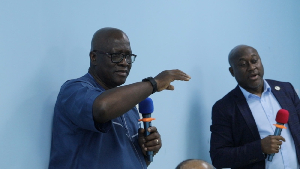 Professor William Ampofo and Professor Gordon Awandare
Professor William Ampofo and Professor Gordon Awandare
In furtherance of efforts towards the creation of Ghana as a hub of vaccine production, the National Vaccine Institute on Thursday, September 5, 2024, engaged the Animal Human Influenza Surveillance team and the National Influenza Center on some major developments in their respective fields.
The meeting, according to Professor William Ampofo, the Chief Executive Officer of the National Vaccine Institute, was aimed at enhancing inter-agency collaborations among the various institutes.
Explaining the purpose of the engagement, Professor Ampofo stated that both organizations are undertaking some surveillance work for influenza and that the forum was meant to share knowledge on the progress of their work.
Professor Ampofo disclosed that the engagements are important as they present the NVI and allied institutes with information and knowledge on the development of vaccines.
“Both of these groups are doing surveillance for influenza, one in humans and the other in animals. Since COVID-19, they have been going around the country to look at animal keepers, both poultry and other animals around military barracks and also in certain areas like wet markets.
“We wanted to understand how this surveillance is going so that we can encourage our researchers to focus on influenza and hopefully develop an influenza vaccine that will help protect the human population from the threat of avian influenza. We are encouraging our scientists to work closely with the public health division to keep surveillance both in humans and animals, and then develop an influenza vaccine that we should be able to use in Ghana in the future,” he said.
Dr. Daniel Lartey Mingle, a Public Health Physician (epidemiology) with the Ghana Armed Forces Medical Service, outlined the nature of the surveillance work and its importance for not just the Ghana Armed Forces but the country at large.
“The surveillance is important to us because it’s a bio threat. And once it gets into our force, because it’s from animals to humans, it means that as humans, our immune system has not really been exposed to it, so it will run riot in us. So if it gets into the force, it means we will not have the Defense Force available to us. To the general public, it’s the same thing, meaning that our productivity is going to come down.
“So we embarked on this first to see what new pathogens there are in terms of influenza, whether it’s changed itself in a way that a particular mutation that has occurred can lead to human infection, and once it comes into humans, then we are in trouble. So we want to always be ahead of the virus and be able to detect what changes there are so that we can put in the right intervention,” he said.
Professor Gordon Awandare, the chair of the research and development committee of NVI, said, “The surveillance and tracking team is tracking the circulation of these viruses. The idea is to be doing this surveillance so that we know which particular types of viruses are in circulation, so that when we have to make a vaccine, we make a vaccine that’s specific to the one that’s in circulation, so that it will be effective,” he said.
EK